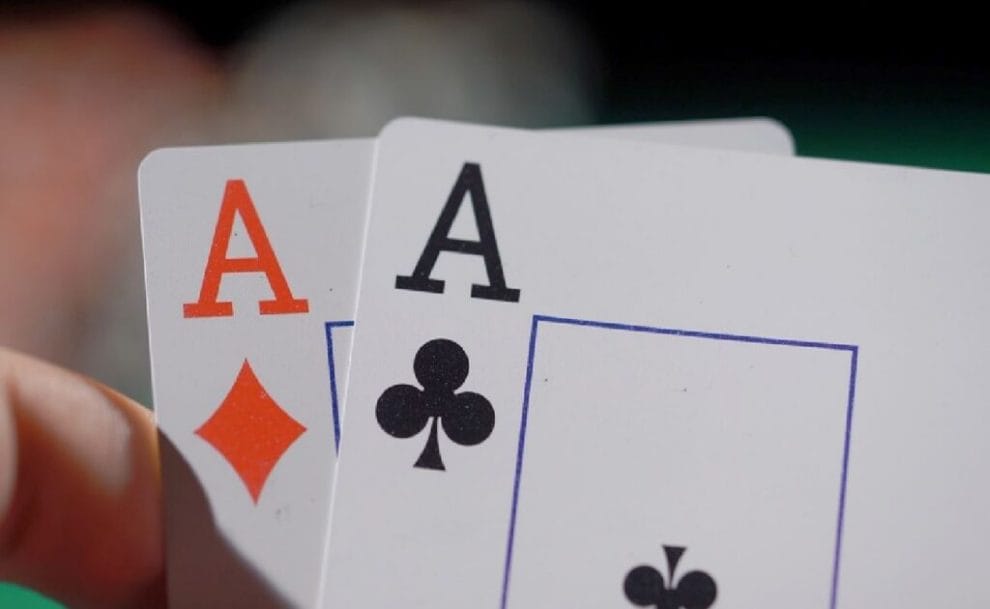
Poker involves far more skill and strategy than other forms of gambling — slots, bingo, or live dealer casino games like roulette, for instance. However, despite this, random chance still greatly affects your results. A run of bad luck makes players question probabilities and decision-making, and it’s easy to fall into the gambler’s fallacy trap.
Read on to learn more about what the gambler’s fallacy is, how it affects your online poker game, and, most importantly, how to avoid it.
What Is Gambler’s Fallacy?
The gambler’s fallacy is the incorrect belief that a random event is more or less likely to occur based on previous results. For example, many gamblers believe that a run or streak of a particular outcome lowers the probability of it occurring again in the immediate future.
This fallacy is an example of cognitive bias that can affect anyone. It’s particularly common in games where correctly guessing the sequence of outcomes results in winning money. Even those who understand statistics and probability often fall victim to this bias.
A very common example of the gambler’s fallacy in action can be found at the roulette wheel. A long run of the ball landing on black would convince a lot of people that red is “due” in the next spin. However, this is incorrect. The probability of the outcome doesn’t change for any single spin.
Sometimes, this bias is dubbed the “Monte Carlo fallacy.” This supposedly dates back to an incident in 1913 at the Monte Carlo Casino. It’s reported that, on one particularly fateful day, the wheel landed on black 26 times in a row. As a result, a lot of gamblers bet heavily on red, thinking that the current hot streak was unsustainable. They are said to have lost millions in the process, proving that this belief is nothing more than a fallacy.
Why So Many Believe in Gambler’s Fallacy

Many people fall into the trap of thinking that past results affect future outcomes in some way. This occurs in all areas of life, not just in gambling. It stems from a natural human instinct to try and rationalize random events and make them seem more logical.
The modern world is more advanced than ever. Self-driving cars, people living to be over 100 years old — there are even Bitcoin poker sites now. But one thing will never change. Human brains are wired to look for ways to make order out of chaotic events. A junk explanation is preferred over no explanation at all. And this is applied to random events, like gambling.
Psychological research also shows that people struggle to think in large sample sizes. In addition, humans often have a cognitive bias that ignores data to focus on the result they want to see.
In online poker tournaments, there’s certainly a lot of strategy involved. But playing against other people will always bring emotions into play. It’s easy to lose focus on the logic and statistics when you’re getting frustrated by your opponents, especially when you suffer a bad beat.
Gambler’s Fallacy in Poker
The gambler’s fallacy definitely influences the enjoyment of games like slots and roulette. It’s hard not to feel that a slot machine is due to pay out soon after a long losing run. And everyone’s already heard about the legendary Monte Carlo incident. Perhaps surprisingly though, this same bias is also present in some online poker real money players.
Imagine, for example, you’re in a heads-up pot and the board shows the potential for your opponent to have a royal flush. However, because you lost to a royal flush in an online poker tournament yesterday, you feel that it would be extremely unlikely for it to happen again.
In this scenario, you would be better off playing the probability ranges that you can actually see. In this case, if your opponent’s range suggests they may have a stronger hand, you should fold — end of discussion. The cards don’t care about what happened in the last hand. It’s important to focus on facts.
Now, imagine you’re dealt 6♣ 5♣. In the past, you’ve won quite a bit with this hand and it’s become your favorite. It sticks in your mind as one you’ve done well with because you’ve won a disproportionate amount recently. Your past performances lead to you playing it again and you end up losing a big pot.
In this scenario, you’re once again better off folding the hand in the face of serious aggression. Just because you’ve won with a speculative hand before, that doesn’t guarantee you’ll have success with it again. Even total beginners who are just learning how to play poker will recognize this. But it’s still easy for the bias to influence your actions.
Tips for Avoiding Gambler’s Fallacy
It’s very difficult to avoid falling into the trap of the gambler’s fallacy. However, there are certain steps that can minimize its effect.
Understand the Fallacy
To avoid letting bias influence you, you need to understand it and the reason why it’s illogical. If you want success in poker online games, you should know that every hand is unrelated to any other. You have the same odds of receiving cards as any other player at the table, and this is the same every time you play.
Focus on the Stats That Matter

When learning poker strategies as a beginner, it’s easy to make mistakes. Some players are sucked into the gambler’s fallacy by concentrating on the wrong stats. You might feel it’s possible to improve your chances by focusing on past hands. Instead, you should focus on the behavior of your opponents and working out their ranges.
Take Breaks
Sometimes, when you’re on a streak, it’s easy to let emotions get the better of you. Even the best players become emotional sometimes, especially if they’ve just suffered several bad beats in a short space of time.
In these situations, it’s difficult to stay logical and avoid letting bias and fallacy take hold. It’s advisable to take a break if you feel you might need it. The great thing about poker is you’re free to walk away from the table at any time.
Breaking Free From Gambler’s Fallacy
It’s easy to let bias take over, especially when real money is at stake. Even the smartest minds can fall victim to the gambler’s fallacy when playing online casino games like slots and poker. However, by failing to take real probabilities into account, you’re only setting yourself up to fail.Understanding what this fallacy is and what it means is the first step to avoiding it. Before you register at the best online poker sites like Borgata Online, make sure you’re focused on your strategy and not superstition.
